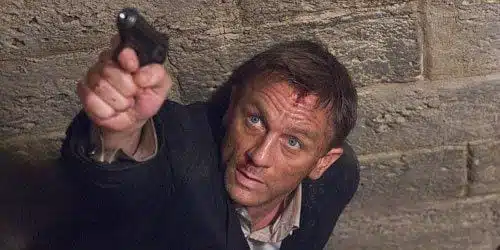
This year’s Bond Villain means to make a mint off water. In another movie (say, Chinatown), his scheme to create a desert in order to profit might make him au courant, deviously in tune with his historical moment. In Quantum of Solace, however, it only makes him silly.
Let’s begin with his name. Dominic Greene (Mathieu Amalric) pretends to be a world-renowned entrepreneur and environmentalist, heading the corporation Greene Planet. Hosting parties for tuxedoed guests, Greene has the look of an old-fashioned Bond Villain, flanked by bejeweled women as he looks down from a balcony, lording over the realm he has so nattily named after himself. Such egoism is hardly news in the annals of Bond Villainy, and neither is Greene’s disdain for all things 00. His lack of imagination is made plain in the nasty murder he ordains: a beautiful woman naked and coated in slick black oil, draped over a hotel room bed in order to daunt the agents in pursuit. It’s so Goldfinger, so overwrought, and so insipidly ironic concerning, you know, Greene Planet.
Opposing Greene, James Bond (Daniel Craig in his second franchise installment) is again vaguely brutish and adamantly moralistic. That’s not to say he won’t cheat to defeat evil; it is to say that he has a rigid sense of who’s good and who isn’t. True, during his previous outing, Casino Royale, Bond ran into a moral dilemma in the person of Vesper Lynd (Eva Green), his own true love who betrayed him — and ended up floating lifeless and murky after drowning, receding from Bond’s view and yours as if in a romantic mist. Now, in the new movie, the memory of Vesper hangs over all proceedings like a shroud.
The effect of this specter on Bond is particularly depressing. While Craig has been much praised for his muscular approach to the role (not to mention his first film’s rather complicated considerations of torture and ambiguities in the spy business), in this episode, directed by Marc Forster and written by Neal Purvis, Paul Haggis, and Robert Wade, he’s subjected to a series of chopped-up action scenes, interrupted by moments of emotional plumbing. He wrestles with the question of Vesper, prodded by M (Judi Dench), who refuses to believe him when he says he feels no desire for revenge, only an abiding sense of “duty.” As Bond makes this assertion with taut jaw, he’s not very convincing. Rather, he seems done in by the notion that M is indeed his maternal superior, and so he must please her, or at least pretend that he’s playing by rules that he and she and all the rest of us know he disrespects from jump.
For her part, M is relegated to sighing and stiff-upper-lipping on the other end of phone calls, delegating the data-searching to minions, worrying over lines crossed while letting Bond run all over the globe in search of clues to what happened with Vesper (this in the name of sussing out Greene’s plot). “You look like hell,” she tells her best agent. “When was the last time you slept?” he dismisses her concern as he must, and so M spends most of her time observing and complaining, not actually making decisions (or making decisions that Bond promptly rejects). “If he could avoid killing every possible lead, it would be deeply appreciated,” she says of Bond, knowing as she says it that he can’t help himself, that his dedication to duty is all he’s got. It’s too bad that the film buys into this sort of melodrama, reductive and bland, decorated by the chase scenes using every type of vehicle (plane, boat, car), plus some acrobatic fights, whether with guns and explosions or just fists and feet, Bond and his rival crashing through glass ceilings and flimsy walls in order to leave 007 bloody again and again, and his “leads” quite killed.
M’s efforts to control from afar have to do with her concerns with larger issues, the interlocking international parts that Bond can’t be bothered with. “Bring him in,” she instructs a field agent named Agent Fields (Gemma Arterton), “Or the Americans will put an end to him.” Here the film entertains a couple of ideas beyond Bond moping, including the inveterate betrayals denoted by the CIA by definition. Though Bond does seem to have a soft spot for Felix Leiter (Jeffrey Wright), whose perpetual scowl may indicate his angry resistance to the status quo or maybe just his consternation, he’s prone to handle distrust and affection in similar ways (that is, with violent self-assertion). His erstwhile super-smoothness is reduced here to a joke about his favorite drink (uttered by a knowledgeable bartender) and a few stolen moments across the table from Mathis (Giancarlo Giannini), not quite retired enough to avoid helping his old friend through yet another impossible mission.
With all these men entangled in dramatic tensions, it’s easy to overlook the Bond Girl, Camille (Olga Kurylenko). She has her own revenge plot against Greene, responsible for her dead father (who was a cruel man, she doesn’t quite explain, “But he was my father”), which makes her more likely than not to deceive Bond. Her primary service to him, however, is to represent his internal messiness: she likes to wear backless dresses to reveal a prominent scar, the result of a traumatic fire during her childhood and sign of her loss and rage. As she so conveniently makes visible Bond’s own struggle — the memory that won’t let go, the strain of forgetting — Camille also plays the usual girly sidekick, pretty, dim, and, much like the CIA and the environmentalist villain, mostly irrelevant when all is said and done. Bond is all about Bond. He’s never pretended anything else.
